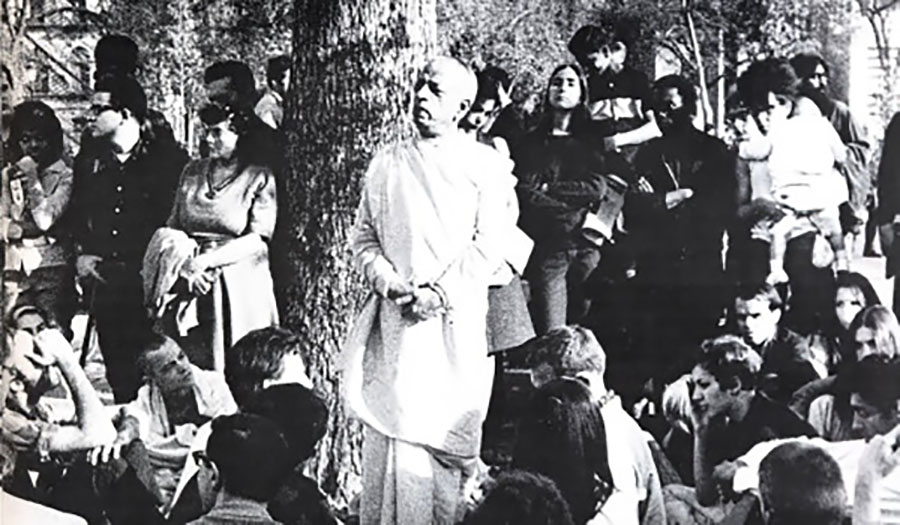ISKCON 50 Meditations: December 29, 2016
By Satsvarupa dasa Goswami | Dec 29, 2016

Revealer of Our Spiritual Identity
Very early in my relationship with Srila Prabhupada, before I was initiated, I asked him a question. “Swamiji, it seems to me that I can be many different persons. When I think of who I am, I think of a composite of different persons. The moods are like different persons I can be. I have heard that the best thing is to act to please Krishna. My question is: how do I know which person in me, or what kind of person, Krishna wants me to be?”
Swamiji didn’t speak to the “mentalness” in my question, but he turned to some of the other people in the room and said, “This boy Steve is nice. He gives his money and he does typing. You also should do like this.” I wasn’t the least bit disappointed with his response. After all, what was I seeking but love, encouragement, and exchange? He looked at me as I actually was in his eyes, who he wanted me to be—a simple servitor who gives plainly and practically what he has. He did not see me as somebody so mental as to be ineffectual, so self-conscious as to not be able to serve.
This reminds me of something else. There’s a line in a poem by Allen Ginsberg that refers to Bhaktivedanta Swami. Imagine Prabhupada seeing Allen in New York and Allen writing candidly about it afterward. “Swami Bhaktivedanta looks at me with a sad eye, at my impossible self-consciousness.” Allen was aware that Prabhupada saw his lack of surrender. Allen could not become a devotee of Krishna. Prabhupada was sad about it, compassionate. He saw that Allen was too much into himself and his own concoctions to surrender to Krishna. Poets like Allen are too busy writing their own “song of God” to hear the message of Bhagavad-gita. They don’t have faith. They don’t accept Krishna’s representative. As Allen summed it up, it was due to his self-consciousness. He could never get past his false-ego consciousness.
Prabhupada looked at me differently. He saw a soul in the body of a young man twenty-six years old who lived in New York City. He saw my many impurities, but he also saw that by my actions I had some sincerity. He acknowledged that sincerity when he answered my question.
I know that I should say that question has been answered for all time, but it hasn’t. And Swamiji is not here in the same way to blast through a question like that—a question I’m crying out to have answered. After all, I wasn’t asking that question so Prabhupada would flatter me. I was crying out. I was trapped in my various selves as I resorted to different kinds of selves and behaviors in order to get along in the world. Prabhupada cut through that for me then. That’s the benefit of having a guru right there. You put yourself on the line and he cracks or cuts the knot in your heart. He doesn’t just work on the generic knot shared by all living entities, but he very directly and personally works on your attachments and confusion. Now that Prabhupada has disappeared, I feel the difference.
When I think of that question, I think also of a popular song. I don’t remember the words exactly, but it’s something like this: “I can be good, I can be bad, I can be happy, I can be sad, it all depends on you. I can be any one of these things and not be particularly happy or sad, except relative to what you want …” So, it is like that. I will do what pleases you, Srila Prabhupada. As you act toward me, I respond toward you. I have no self per se, except for my relationship with you. I have no self except as you define it in our loving, living relationship; our demanding relationship. Krishna consciousness means I am the eternal servant of you. “What do you want me to do?” If we can sincerely ask that question, then Krishna will tell us what He wants us to do.















